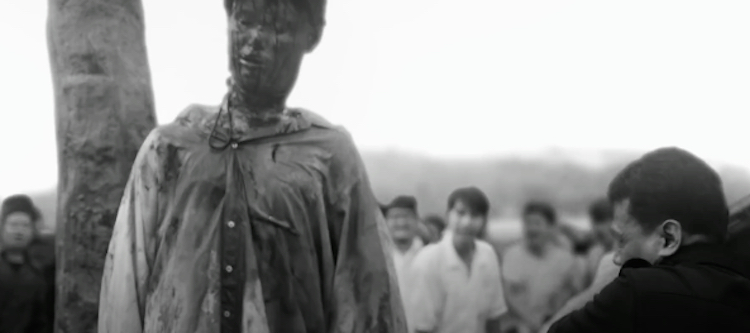
In October 2018, with the junta still in power four years after the 2014 coup, Rap Against Dictatorship released their debut single, My Country Has (ประเทศกูมี), a song condemning political corruption, military impunity, and state violence. The song’s black-and-white promo video, directed Teerawat Rujintham, ends with a battered mannequin hanging from a tree, a reference to the corpse in Neal Ulevich’s infamous photograph of the 6th October 1976 massacre.
Whereas anti-coup films and artworks disguise their messages with coded metaphors, My Country Has was uncompromising in its criticism of the junta. The lyrics included a litany of political scandals, and the rappers made no concessions to Thailand's culture of conformity, deference, and emotional restraint. This anthemic song succinctly and directly encapsulated the frustration of anti-coup protesters whose dissent was otherwise suppressed.
Comparable artistic expressions of anger towards the state — Thunska Pansittivorakul’s documentaries and Vasan Sitthiket’s paintings, for example — have not crossed over to mainstream audiences. My Country Has, on the other hand, benefitted from its popular modes of expression (rap) and distribution (online streaming): the song’s YouTube video went viral, being viewed more than ten million times in its first week of release.
Two days before the 24th March election, Rap Against Dictatorship released their second single, 250 Bootlickers (250 สอพลอ), referring to the 250 senators appointed by the junta in what is destined to be a rubber-stamp Senate. The video for 250 Bootlickers was filmed at Headache Stencil’s Thailand Casino exhibition, and the song and exhibition both show how the election was rigged in Prayut’s favour. The exhibition’s centrepiece, busts of Prayut Chan-o-cha and former PM Thaksin Shinawatra playing a high-stakes poker game for the future of Thailand, perfectly encapsulates the song’s theme.
The election was one of the most dramatic, and contentious, in Thai history. Thai Raksa Chart’s extraordinary decision to nominate Princess Ubolratana for PM was swiftly rejected by her brother, King Rama X, leading to the dissolution of the party. Since the election, Thanathorn Juangroongruangkit, leader of the progressive Future Forward party, has faced various trumped-up charges. A tentative anti-Prayut coalition led by Pheu Thai has a potential parliamentary majority based on unofficial results, though the Election Commission has still not yet confirmed how it will allocate seats under an ambiguous system of proportional representation.
Whereas anti-coup films and artworks disguise their messages with coded metaphors, My Country Has was uncompromising in its criticism of the junta. The lyrics included a litany of political scandals, and the rappers made no concessions to Thailand's culture of conformity, deference, and emotional restraint. This anthemic song succinctly and directly encapsulated the frustration of anti-coup protesters whose dissent was otherwise suppressed.
Comparable artistic expressions of anger towards the state — Thunska Pansittivorakul’s documentaries and Vasan Sitthiket’s paintings, for example — have not crossed over to mainstream audiences. My Country Has, on the other hand, benefitted from its popular modes of expression (rap) and distribution (online streaming): the song’s YouTube video went viral, being viewed more than ten million times in its first week of release.
Two days before the 24th March election, Rap Against Dictatorship released their second single, 250 Bootlickers (250 สอพลอ), referring to the 250 senators appointed by the junta in what is destined to be a rubber-stamp Senate. The video for 250 Bootlickers was filmed at Headache Stencil’s Thailand Casino exhibition, and the song and exhibition both show how the election was rigged in Prayut’s favour. The exhibition’s centrepiece, busts of Prayut Chan-o-cha and former PM Thaksin Shinawatra playing a high-stakes poker game for the future of Thailand, perfectly encapsulates the song’s theme.
The election was one of the most dramatic, and contentious, in Thai history. Thai Raksa Chart’s extraordinary decision to nominate Princess Ubolratana for PM was swiftly rejected by her brother, King Rama X, leading to the dissolution of the party. Since the election, Thanathorn Juangroongruangkit, leader of the progressive Future Forward party, has faced various trumped-up charges. A tentative anti-Prayut coalition led by Pheu Thai has a potential parliamentary majority based on unofficial results, though the Election Commission has still not yet confirmed how it will allocate seats under an ambiguous system of proportional representation.

